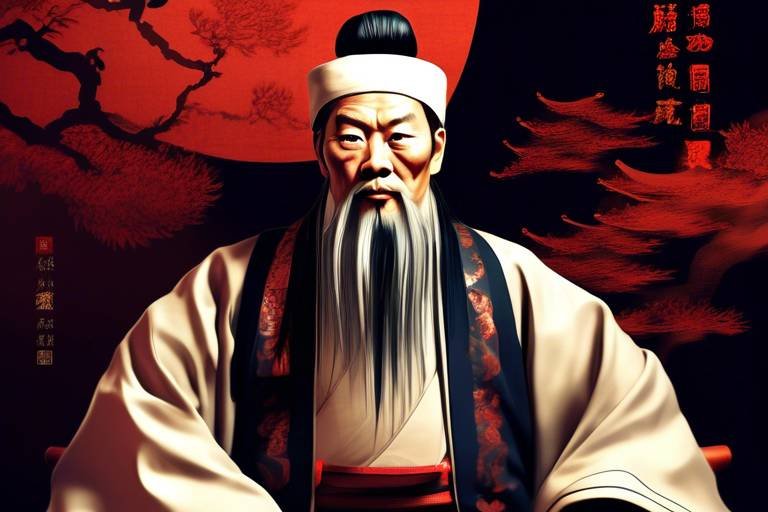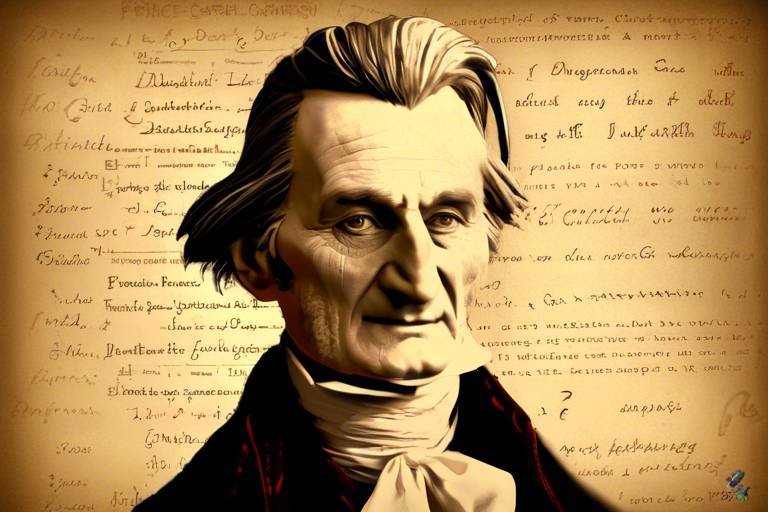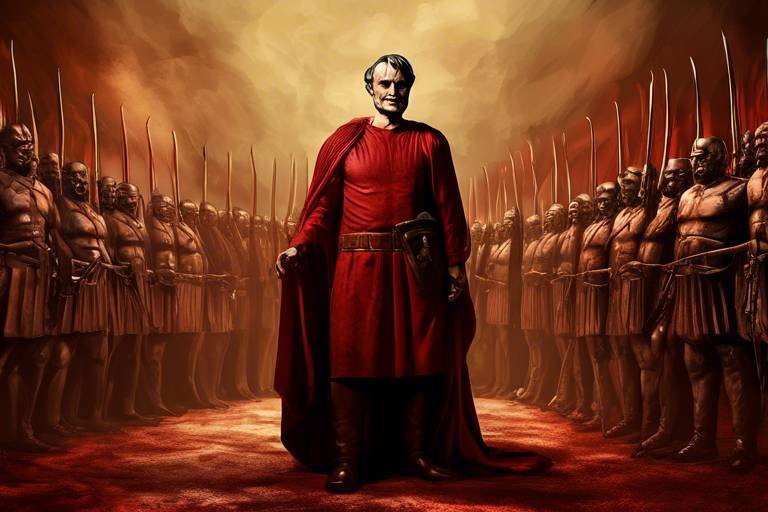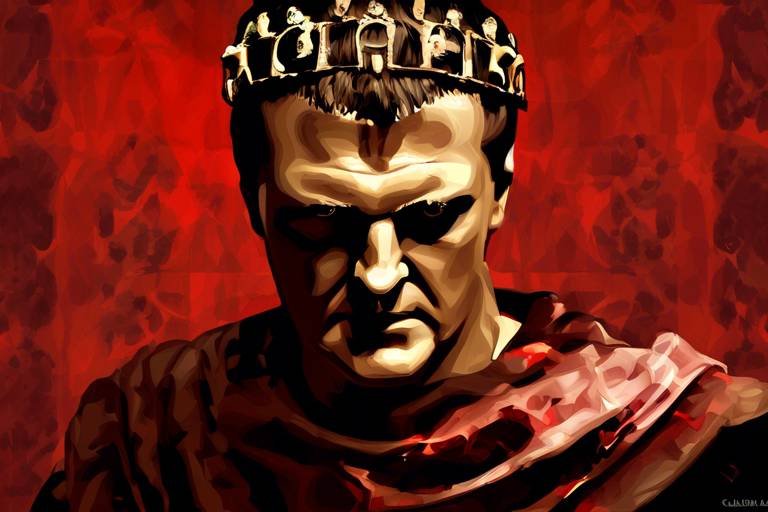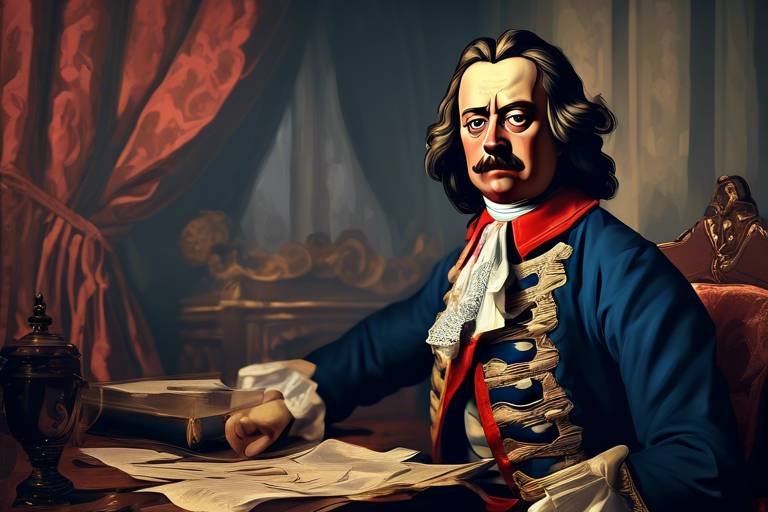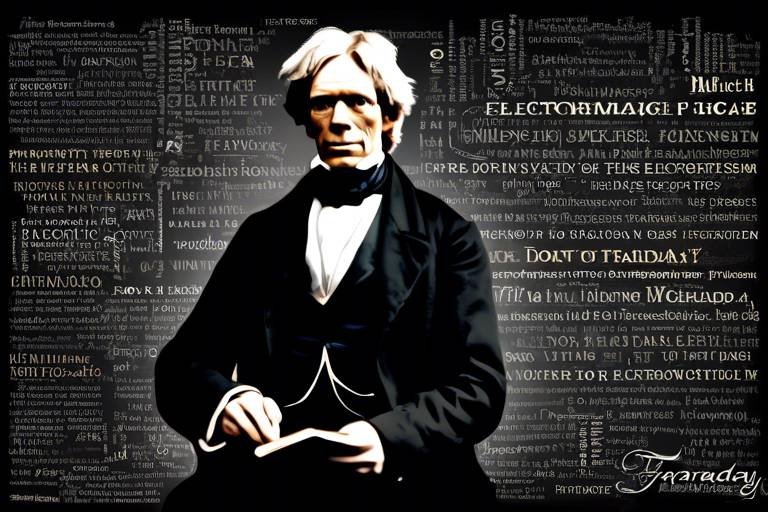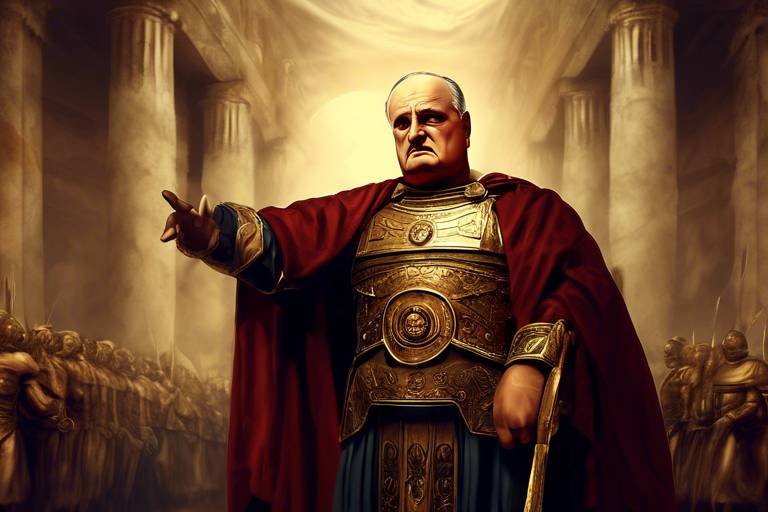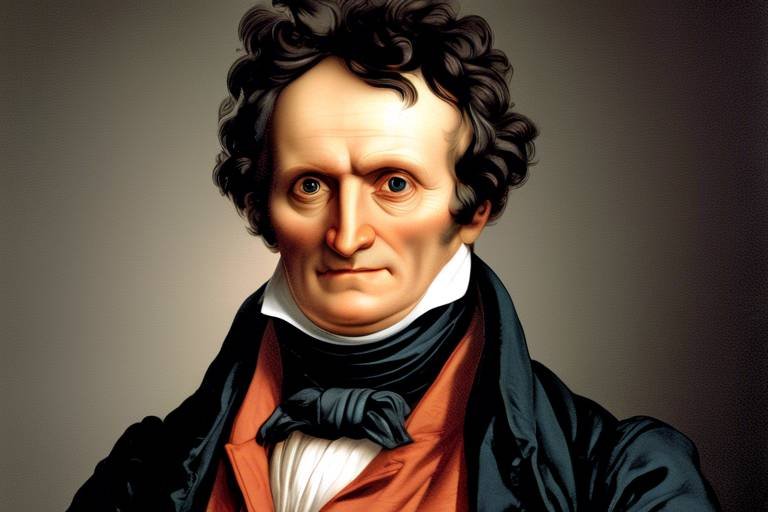Sima Qian: The Grand Historian of China
Meet Sima Qian, the esteemed figure known as the Father of Chinese historiography. His remarkable contributions have left an indelible mark on the realm of historical records, shaping the landscape of Chinese historical studies for generations to come.

Early Life and Background
Explore the life and contributions of Sima Qian, known as the Father of Chinese historiography. Learn about his enduring legacy in shaping historical records and his significant impact on Chinese historical studies.
Discover Sima Qian's upbringing, family background, and the cultural influences that shaped his passion for history and writing. Sima Qian was born in a prominent scholarly family during the Han Dynasty in China. His father, Sima Tan, was a historian and the Grand Astrologer. Growing up in such an environment, Sima Qian was exposed to historical texts and scholarly discussions from a young age, igniting his interest in recording the past.

Historical Works and Achievements
Sima Qian, often revered as the Father of Chinese historiography, left an indelible mark on the landscape of historical studies with his monumental works and groundbreaking achievements. His most notable contribution, the Records of the Grand Historian, stands as a testament to his dedication and meticulous approach to chronicling China's rich history. Through his writings, Sima Qian not only documented the past but also shaped the way future generations would perceive and understand Chinese history.
One of Sima Qian's most significant achievements was his meticulous compilation of historical records, spanning from the ancient legendary period to his contemporary era. His comprehensive approach to historical documentation set a new standard in Chinese historiography, emphasizing the importance of accuracy and thoroughness in recording events. The Records of the Grand Historian remains a cornerstone of Chinese historical literature, providing invaluable insights into the cultural, political, and social fabric of ancient China.
Furthermore, Sima Qian's literary prowess extended beyond mere documentation; his writings were characterized by a vivid narrative style that brought historical figures and events to life on the pages of his works. By weaving together multiple sources and perspectives, Sima Qian created a nuanced and multi-dimensional portrayal of Chinese history, enriching the understanding of past events for generations to come.
In addition to his monumental work, Sima Qian made significant contributions to the development of historical methodologies and research techniques. His meticulous approach to sourcing information, cross-referencing multiple accounts, and critically analyzing historical narratives set a precedent for future historians, shaping the way historical research is conducted in China.

Records of the Grand Historian,
The Records of the Grand Historian is a monumental work by Sima Qian that stands as a cornerstone of Chinese historiography. This comprehensive text, also known as Shiji, covers the history of China from legendary times to the first century BCE. Sima Qian meticulously documented the political, social, and cultural developments of various dynasties, providing a rich tapestry of historical accounts for future generations.
Within the Records of the Grand Historian, Sima Qian employed a narrative style that blended factual information with vivid storytelling. His meticulous attention to detail and use of diverse sources, including official documents, interviews, and his own observations, set a new standard for historical writing in ancient China. The work is structured into different categories, such as Annals, Treatises, and Biographies, offering a comprehensive view of Chinese history and society.
One of the notable aspects of the Records of the Grand Historian is its portrayal of historical figures in a nuanced light. Sima Qian sought to present a balanced view of rulers, officials, and common people, highlighting their virtues, flaws, and contributions to the shaping of Chinese civilization. Through his vivid descriptions and engaging narratives, Sima Qian brought history to life, making it accessible and relatable to readers across generations.

and his contributions to Chinese historiography and literature.
When exploring Sima Qian's contributions to Chinese historiography and literature, one cannot overlook the profound impact he had on shaping the historical landscape of China. Through his seminal work, the Records of the Grand Historian, Sima Qian not only chronicled the events of the past but also established a standard for historical writing that would endure for centuries.
His meticulous attention to detail and rigorous research methods set a precedent for future historians, influencing the way in which historical records were compiled and interpreted. Sima Qian's dedication to preserving the integrity of historical accounts ensured that his works would serve as a cornerstone of Chinese historiography.
Furthermore, Sima Qian's contributions extended beyond mere documentation; his writings reflected a deep understanding of Chinese culture, society, and politics. By weaving together historical events with insightful commentary, he provided readers with a comprehensive view of the past, shedding light on the complexities of Chinese history.
In the realm of literature, Sima Qian's impact was equally significant. His narrative style, characterized by vivid storytelling and vivid descriptions, captivated readers and brought history to life. Through his literary prowess, he transformed historical records into engaging narratives that resonated with audiences across generations.
Overall, Sima Qian's contributions to Chinese historiography and literature were multifaceted, encompassing not only the recording of historical events but also the interpretation and analysis of the past. His works continue to inspire scholars and readers alike, underscoring the enduring legacy of the Father of Chinese historiography.

Writing Style and Techniques
Sima Qian, often hailed as the Father of Chinese historiography, possessed a writing style and techniques that set him apart as a grand historian. His approach to documenting historical events was meticulous and comprehensive, reflecting his deep commitment to preserving the past for future generations. Sima Qian's writing style was characterized by a blend of narrative storytelling and factual accuracy, creating a vivid tapestry of China's history.
One of the key techniques that Sima Qian employed was the use of multiple sources to corroborate historical events. By cross-referencing different accounts and perspectives, he aimed to present a well-rounded and unbiased view of the past. This method not only added depth to his narratives but also ensured a more comprehensive understanding of complex historical events.
Moreover, Sima Qian's ability to weave together disparate sources into a coherent and engaging narrative was a testament to his skill as a historian. His writing transcended mere documentation, transforming historical records into compelling stories that captivated readers and scholars alike. Through his masterful storytelling, Sima Qian brought history to life, making it accessible and engaging for a wide audience.

Challenges and Controversies
As Sima Qian embarked on his journey as a historian, he encountered numerous challenges and controversies that tested his dedication to preserving historical records. One of the most significant obstacles he faced was the political pressures of his time. Sima Qian lived during the reign of Emperor Wu of Han, a period marked by strict censorship and control over historical narratives. Despite these constraints, Sima Qian remained steadfast in his commitment to recording the truth, even at great personal risk.
Furthermore, Sima Qian's decision to uphold his principles led to personal sacrifices that would shape his legacy. In a pivotal moment, he chose to endure castration rather than compromise his integrity as a historian. This act of defiance against unjust authority not only symbolized his unwavering dedication to his craft but also solidified his reputation as a scholar of unparalleled courage and conviction.
Moreover, controversies surrounded Sima Qian's interpretations of historical events, with critics questioning the accuracy and objectivity of his accounts. Some scholars have argued that his writings may have been influenced by personal biases or political agendas, leading to debates about the reliability of his historical narratives. Despite these criticisms, Sima Qian's enduring legacy as the Father of Chinese historiography remains undisputed, showcasing his resilience in the face of adversity.

Legacy and Influence
Exploring the legacy and influence of Sima Qian unveils a profound impact on Chinese historiography and literature. His meticulous documentation of historical events in the Records of the Grand Historian not only preserved the past but also set a standard for future historians to follow. Sima Qian's dedication to accuracy and detail laid the foundation for the study of Chinese history as we know it today.
One of the most significant aspects of Sima Qian's legacy is his role in shaping the narrative of Chinese history. His works not only chronicle the rise and fall of dynasties but also delve into the cultural and social aspects of ancient China. By providing a comprehensive view of the past, Sima Qian's writings have become invaluable sources for understanding the complexities of Chinese civilization.
Moreover, Sima Qian's influence extends beyond the realm of history. His storytelling prowess and ability to bring historical figures to life have inspired generations of writers and scholars. The vivid portrayals of emperors, generals, and commoners in his works have captivated readers for centuries, making his legacy enduring and far-reaching.
In the modern era, Sima Qian's works continue to be studied and revered for their insight into the human experience. His exploration of power, morality, and the cyclical nature of history resonates with contemporary audiences, prompting reflections on the relevance of past events to the present day. By examining Sima Qian's legacy, we not only gain a deeper understanding of Chinese history but also insight into the universal themes that connect us across time and cultures.

Historical Accuracy and Criticisms
When it comes to assessing the historical accuracy of Sima Qian's works, scholars have engaged in extensive debates and discussions over the years. The monumental Records of the Grand Historian is often praised for its detailed accounts of ancient Chinese history, providing valuable insights into the political, social, and cultural landscape of the time. However, like any historical record, Sima Qian's writings are not without their criticisms and controversies.
One of the main criticisms leveled against Sima Qian is the potential for bias in his historical accounts. As a court historian during the Han dynasty, Sima Qian was intricately tied to the political establishment of his time. Some scholars argue that his close association with the ruling elite may have influenced his interpretations of certain events and figures, leading to a skewed representation of history.
Furthermore, the reliance on oral traditions, official documents, and other sources available to Sima Qian raises questions about the accuracy and reliability of his narratives. The lack of verifiable sources for some of the events described in his works has led to skepticism among historians regarding the factual basis of certain accounts.
Despite these criticisms, Sima Qian's meticulous attention to detail and his commitment to preserving historical records have earned him widespread acclaim. His comprehensive approach to documenting the past has laid the foundation for Chinese historiography and inspired generations of scholars to delve into the annals of history with a critical yet appreciative eye.

Recognition and Honors
When it comes to recognition and honors, Sima Qian's legacy shines brightly in the annals of Chinese history. Despite facing immense challenges and enduring personal sacrifices, his contributions to historiography have not gone unnoticed. Posthumously, Sima Qian has been revered and honored for his dedication to preserving the historical records of China.
One of the most significant recognitions bestowed upon Sima Qian is the enduring title of the "Father of Chinese historiography." This title symbolizes his pivotal role in shaping the course of historical studies in China and his unparalleled dedication to documenting the past with meticulous detail and accuracy.
Furthermore, Sima Qian's work, the Records of the Grand Historian, has been hailed as a monumental achievement in Chinese literature and historical documentation. This magnum opus solidified his reputation as a master historian and earned him widespread acclaim both during his time and in the centuries that followed.
In addition to these accolades, Sima Qian has been honored through various memorials and tributes dedicated to his memory. His contributions have been celebrated through statues, museums, and scholarly conferences that aim to commemorate his enduring impact on Chinese historical studies.
Moreover, the enduring influence of Sima Qian's works can be seen in the countless historians and scholars who continue to draw inspiration from his methodologies and narrative techniques. His legacy serves as a guiding light for those seeking to unravel the complexities of China's rich historical tapestry.

Modern Perspectives and Relevance
Looking at Sima Qian's works through a modern lens, one cannot help but marvel at the timeless relevance and significance they hold in the field of Chinese history. Despite being centuries old, his meticulous records and insightful narratives continue to captivate scholars and historians alike, shedding light on a bygone era with remarkable clarity and depth.
One of the key aspects that make Sima Qian's writings relevant today is his unwavering commitment to accuracy and detail. His dedication to thorough research and verification of facts sets a high standard for historical documentation, serving as a benchmark for contemporary historians striving for authenticity in their work.
Moreover, the themes and narratives explored in Sima Qian's writings resonate with modern audiences, offering valuable insights into human nature, societal dynamics, and the complexities of power and governance. His ability to weave together personal anecdotes, political intrigue, and cultural nuances creates a rich tapestry of historical knowledge that transcends time and space.
Furthermore, the ongoing scholarly debates surrounding Sima Qian's legacy highlight the evolving nature of historical interpretation and the importance of critical analysis in understanding the past. As new discoveries are made and perspectives shift, his works continue to spark intellectual discourse and inspire further research into the intricacies of ancient Chinese civilization.
Frequently Asked Questions
- Who was Sima Qian?
Sima Qian, also known as the Father of Chinese historiography, was a renowned historian in ancient China who made significant contributions to the field of historical records.
- What are some of Sima Qian's major works?
Sima Qian's most famous work is the monumental "Records of the Grand Historian," which is considered a foundational text in Chinese historiography.
- What challenges did Sima Qian face during his career?
Sima Qian faced various obstacles and controversies, including political pressures and personal sacrifices, in his pursuit of writing accurate historical records.
- What is Sima Qian's legacy and influence?
Sima Qian's works have had a lasting impact on Chinese historiography and literature, influencing subsequent historians and shaping the study of Chinese history.
- How accurate are Sima Qian's historical accounts?
There have been debates regarding the accuracy of Sima Qian's historical interpretations and biases, with scholars evaluating the reliability of his accounts.
- What recognition has Sima Qian received for his contributions?
Posthumously, Sima Qian has been honored for his significant contributions to Chinese history and culture, recognizing his enduring legacy.

